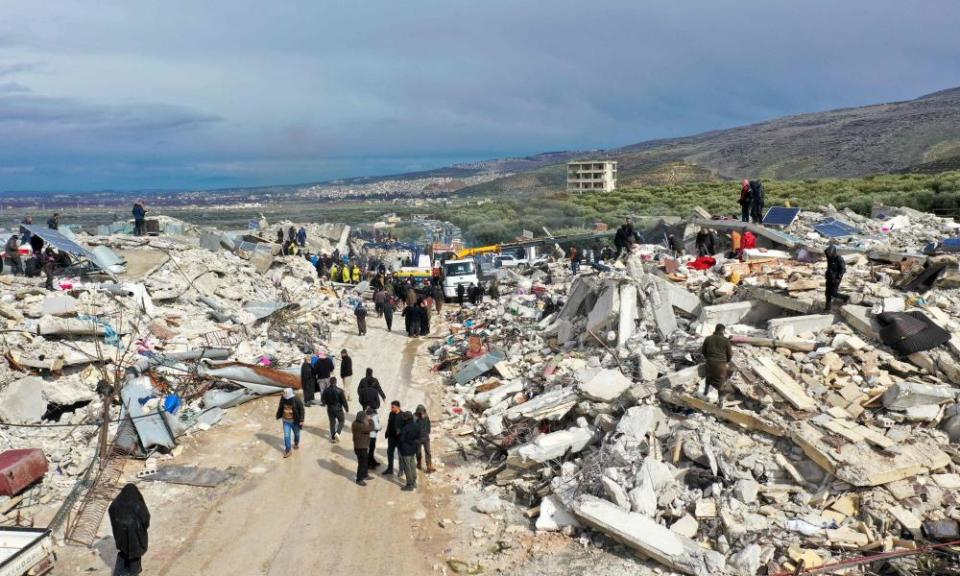‘There is nothing left’: earthquake adds to suffering in war-torn Syria

People living in north-west Syria are used to being woken up at night by collapsing buildings. Often, the destruction is accompanied by the sound of jets flying overhead as Bashar al-Assad and his Russian allies drop bombs on schools, hospitals and other civilian infrastructure.
Caught between the Damascus regime and militant groups in control of the area, life for the estimated population of 4.5 million is already very hard: as well as airstrikes, in some places there is still episodic ground fighting, and 91% of the people here are dependent on aid to survive. The 7.8-magnitude earthquake that struck the region in the early hours of Monday, and the strong second shock hours later, will add to already intolerable suffering.
“At first I thought it was helicopters dropping barrel bombs. I woke up and went to grab my son,” said Ismail Alabdullah, 36, a volunteer with the White Helmets rescuers from the village of Sarmada.
“We are used to digging people out of the rubble but this is different. So many people are still stuck and they will die because we don’t have enough equipment to get to them all. There is nothing left, nothing at all.”

After more than a decade of civil war, Idlib province and parts of the surrounding Aleppo countryside are the last pocket of Syria still beyond Assad’s control other than the Kurdish-held north-east: about three-quarters of the people living in the area fled to escape fighting in other parts of the country. Some of them have been displaced several times over.
Most of north-west Syria is ruled by Hayat Tahrir al-Sham, a militia that has tried to distance itself from its al-Qaida origins but tolerates little dissent and enforces religious edicts, while other parts of the region are controlled by Turkish-backed factions.
Fighting still flares from time to time with Russian-backed Syrian forces nearby, and years of bombardment have already stretched healthcare services to breaking point. At least 1.7 million people live in structurally unsound buildings or tents in freezing winter temperatures, making them particularly vulnerable to the widespread damage caused by the earthquake.
A total of 783 deaths have been reported across Syria, with 138 of those in opposition-held territory, but the toll is likely to rise much higher with hundreds, if not thousands, more people believed to still be trapped under debris, medics said.
The scene at hospitals and clinics in the north-west of the country on Monday was chaotic. Four medical centres run by the Syrian American Medical Society were considerably damaged, a spokesperson said, and two had had to be completely evacuated.
Doctors described being so overwhelmed they began treating patients in hallways while bodies piled up next to them, rubble dust choking healthcare workers and survivors.
“I have treated lots of children today and I am afraid there are lots more dead under the debris to come. People will run out of air and die,” said Dr Osama Salloum, who works at the Bab al-Hawa hospital near the Turkish border.
“It’s a catastrophe of a scale we have not seen before and I am scared the way I am scared in airstrikes. I am scared for my family because of aftershocks. I just felt one now. There are doctors we have not heard from so maybe they are dead, too.”
With communication lines down in much of the country, millions of people in the Syrian diaspora scattered across the world have struggled to reach family members to confirm they are safe.
The government-controlled, poverty-stricken cities of Aleppo, Latakia, Tartous and Hama also reported major damage on Monday, with rescue operations under way and promises of food, medical assistance and building safety checks from the state.
One man originally from Aleppo, who asked not to be named for fear of reprisals, said that his family still in the city had run down to the street from their apartment after the quake struck at 4am. Water and electricity supplies had been cut, and there was no sign of any aid.
“The whole neighbourhood is outside. They are alright, thank god, but it’s very cold and they don’t know where to go,” he said.
Another 1,121 people have been confirmed dead in south-west Turkey, the earthquake’s epicentre, and the devastation has for now all but shut off north-west Syria’s only lifeline to the outside world – the border crossing that connects the enclave to the Turkish town of Reyhanlı.
Since 2014, international aid has flowed to the area through the Bab al-Hawa crossing, while urgent medical cases that cannot be treated with north-west Syria’s limited capabilities have been transported north for care in Turkey.
But UN-backed humanitarian programming in north-west Syria has been underfunded for years now and does not include natural disaster planning. With Turkey’s own medical infrastructure now overwhelmed, and nearby airports closed and roads blocked, it is not yet clear what help can immediately reach this trapped population.
“We were already living in a desperate situation. I did not dream it could get worse,” Dr Salloum said. “We have survived so much and now this.”

 Yahoo Movies
Yahoo Movies 